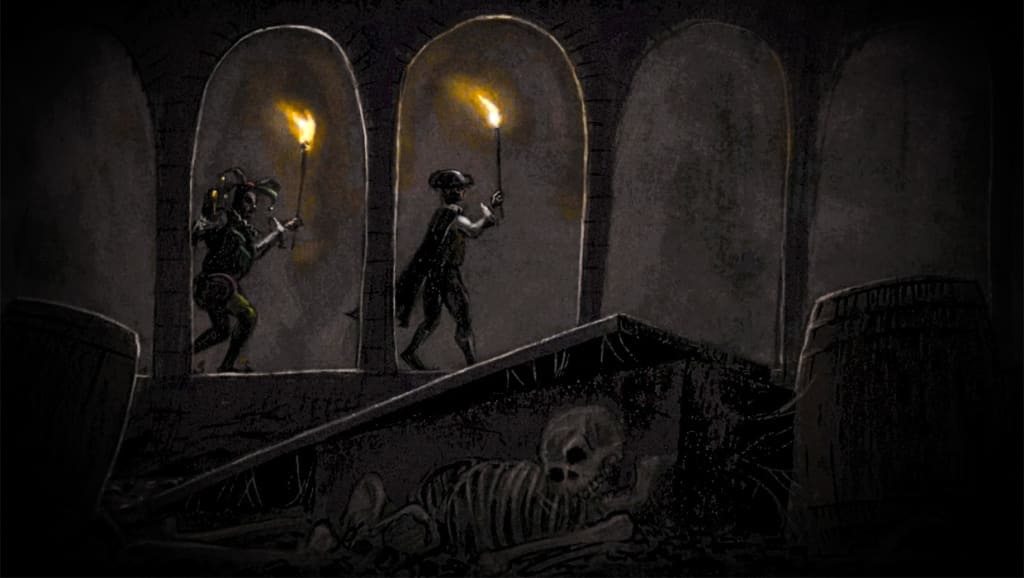"The Cask of Amontillado" by Edgar Allan Poe
A Reading Experience (Pt.54)

I first read this story when I was a younger child because I used to have some tapes of the stories of Edgar Allan Poe read by the likes of Vincent Price and Christopher Lee (yes, I was a fairly odd child). Oh, and when I say ‘child’, I mean about nine years’ old, or roundabout that age. I used to play these tapes on my radio and cassette player and well, they scared the absolute crap out of me. After a while, as I grew up, I got these ‘tapes’ on a digital file and managed to put them on an MP3 player that plugged into my desktop computer. I no longer had to wind my cassette tapes with a pencil just to listen to scary accents reading my favourite gothic stories. The one story that always terrified me though was “The Cask of Amontillado” - it wasn’t “The Raven” or “The Pit and the Pendulum” and no, it wasn’t “Tell Tale Heart” or “The Murders in the Rue Morgue” - it was always “The Cask of Amontillado”.
It was everything that it was: set at a carnival that was supposed to be a happy occasion, two ‘friends’ meeting up again, lying and revenge plots becoming entailed in the storyline and the sheer violence and madness of the ending. The one thing that I always thought about when I was reading the story and listening to it (I liked to do both at the same time and then, exclusively as I grew up and eventually, I lost the tapes and the digital files - it was upsetting) about how little I actually knew about the narrator. There was a certain contempt I always held for Fortunato - I took him as this loathsome almost animalistic man with a strange habit of getting drunk off everything he saw that was alcoholic. The reader (and often the inexperienced - or rather ‘less’ experienced reader) is made to hate Fortunato because out of the voice of the narrator, that is really all we have. However, we are never given the actual reasons why the narrator hates him - it relies solely on the reasoning of some distant public humiliation of some kind we aren’t given details of. The more I thought about this, the more I felt sorry for the character of Fortunato, no matter how much the reader is made to hate him. I feel like the less the reader knows about the narrator, the better it was for the narrator because of the fact the narrator wants to keep his identity concealed. In a lot of artworks and in the story, he is perceived as wearing the costume of one of the plague doctors of old. This only makes it worse because we have quite a violent connotation to the costume.
As I grew up and started to study it in even more detail and I got even more information and theories from it. The first theory I had was whether I was sure that our narrator was a man. There was no way of actually knowing whether Montresor was a man because he/she is never referred to in the third person in the story. But, if a woman had suffered a scandalous humiliation at the hands of a man and therefore, become the ‘fallen woman’ then that would align with the culture of the 19th century fallen women of other literary classics of the same sort of time period. The next theory I had was whether the narrator was actually telling us the truth about the humiliation story. The question in my mind was concerning what the narrator had done to receive this public humiliation at the hands of Fortunato and what he/she had been found out doing that was either wrong or a deception of someone that lead Fortunato to commit to humiliating them. The final theory I had was that if this Montresor was rich enough to have a family vault in which members are buried then the name of the family must have been fairly important and, because Fortunato is described as being important - then this could be a rivalry that is much older than the two of them. It could date back to a history that we do not know about.
Every time I re-read this story, and I re-read it often, it becomes more and more fascinating to me. It is one of those stories that, when you’ve read it once and you know the ending, you want to know exactly why the ending is so violent when this person is reacting to what amounts to a few insults and name-calling in public. It requires serious explanation. So far, I have many theories but no answer - and I don’t think I ever will have a true answer.
About the Creator
Annie Kapur
200K+ Reads on Vocal.
English Lecturer
🎓Literature & Writing (B.A)
🎓Film & Writing (M.A)
🎓Secondary English Education (PgDipEd) (QTS)
📍Birmingham, UK






Comments
There are no comments for this story
Be the first to respond and start the conversation.